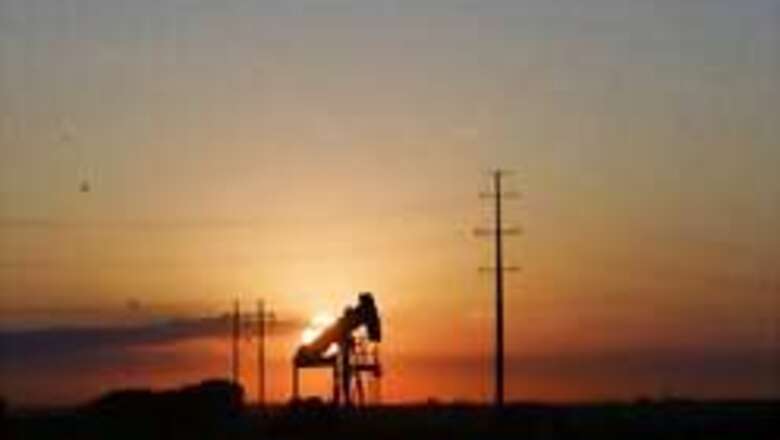
views
Singapore: Oil held firm above $75 a barrel on Tuesday after a profit-taking slump, supported by accelerating economic expansion in number-two oil consumer China and the risk of expanding Middle East violence.
US light sweet crude for August delivery rose 15 cents to $75.45 a barrel by 0327 GMT, taking pause from Monday's 2.25 per cent dive amid a commodity-wide rout that knocked gold 2 percent lower and hammered copper 3 per cent.
Brent crude for September gained 6 cents to $75.98 a barrel.
Oil prices are nearly $3 below last Friday's record-high of $78.40 after dealers took some relief that mounting violence between Israel and Hezbollah had not yet engulfed oil-rich neighbours.
But analysts warned against complacency.
"There is the danger that the Middle East situation could spin out of control, but there is also a good chance that things will settle down," said Tony Nunan, a risk manager at Mitsubishi Corp in Tokyo.
World efforts to defuse the growing crisis have yet to show any signs of ending Israel's week-long assault in retaliation against Hezbollah attacks.
On Tuesday warplane attacks on south Lebanon killed six people, taking the toll to 210.
Hezbollah, the guerrilla group that is backed by Syria and Iran and is part of Lebanon's government, has attacked a naval vessel and fired hundreds of rockets at northern Israel.
Oil traders fear the violence, triggered when Hezbollah seized two Israeli soldiers and killed eight on July 12, could engulf major regional crude oil producers, who provide nearly a third of the world's oil.
Lebanon has repeatedly called for an immediate ceasefire, but world powers said any solution to the crisis must include the release of the two soldiers.
Israel also wants Hezbollah to disarm in line with United Nations Security Council resolutions.
PAGE_BREAK
"The market's biggest fear is that Iran, a financial backer of Hezbollah and OPEC's number two supplier, could be drawn into the conflict," said Andrew Harrington from ANZ Bank.
The conflict may also compound the haggling between the West and Iran over Tehran's nuclear programme, a stand-off that has fuelled oil's 24 percent gain this year on fears that the exporter could use its crude supplies as political leverage.
Iran funded and supplied Hezbollah during the 1980s, but denies supplying weapons in the latest round of violence, saying its support is purely moral rather than military.
Perennial tension in Iraq also kept prices on the boil, with the head of the country's North Oil Company kidnapped in the capital, the second high-profile abduction in two days.
Iraq was forced to cancel its latest tender to sell Kirkuk crude from Turkey after halting pipeline exports 11 days ago.
Fresh fuel for gains emerged on Tuesday from China, which reported second-quarter growth of 11.3 per cent, faster than the 10.5 per cent predicted by analysts and even more than the 10.9 per cent leaked to a state-run paper last week.
As per the statistics, the growth quickened from the first quarter's 10.3 per cent on strong investment and industrial output, giving traders more confidence that recently robust oil demand indicators may extend to later this year.
Implied oil consumption grew at double-digit rates in April and May, Reuters calculations based on official data show, the fastest rate since 2004's explosive 15 per cent spurt that sent shockwaves through the global oil market.
Data last week showed oil product imports also surged in June, hinting at a third-straight month of healthy growth as Beijing's modest fuel price rises encourage refiners to raise domestic sales while not cutting into end-user demand.


















Comments
0 comment